The Butte County Board of Supervisors voted unanimously Tuesday to oppose California’s sanctuary law, passing a resolution that opposes state policy on immigration and recognizes federal government authority.
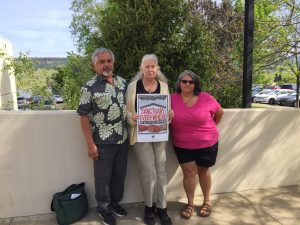
Dave Garcia, Chris Nelson and Julie Garza-Withers protested the board’s vote.
Supervisors voted 5-0 in favor of a political statement, a resolution that contends that the sanctuary law places “restrictions and limitations” on the Butte County Sheriff’s Office that could have a “potentially negative impact on public safety.”
The resolution, which escaped the notice of most media outlets and the public, acknowledges the Trump administration’s lawsuit against the state of California and says the administration could attempt to withhold federal grants from “jurisdictions that violate federal law” by prohibiting collaboration with U.S. Immigration and Customs Enforcement (ICE).
California’s so-called sanctuary law, the California Values Act, limits the ability of law enforcement to detain people on behalf of ICE and otherwise restricts collaboration with ICE — unless serious or violent crimes have been committed.
The resolution was passed as farmers and ranchers in rural California grapple with labor shortages related to the Trump administration’s immigration crackdown, and as local politicians backed by conservative constituencies wrestle with immigration politics and a tide of nativist sentiment.
The Butte County supervisors stopped short of joining a list of conservative California counties and cities that are suing the state. But they said they were convinced that state and federal law are now in conflict because of the sanctuary law, an argument that has been put forth by Butte County Sheriff Kory Honea.
California legislators have said that the California Values Act works in concert with federal laws, and they want to ensure that the job of immigration enforcement isn’t turned over to local agencies.
Board Chair Steve Lambert, in a telephone interview with ChicoSol on Wednesday, said he views the resolution as a measure to support the sheriff in his quest for flexibility as well as a statement to “appease” extremist viewpoints on immigration. But Lambert said he received calls after the meeting from constituents who said the supervisors hadn’t gone far enough in committing to fight the state’s immigration legislation.
Lambert, a District 4 supervisor, also indicated those views are represented on the board. “Some members on our board… want everybody out of the country,” Lambert said.
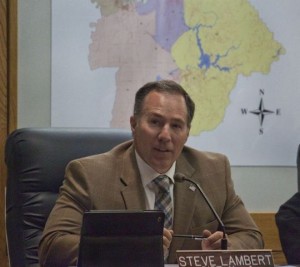
When asked to be more specific, Lambert said District 2 Supervisor Larry Wahl, in particular, represents people with “extreme energies.”
Wahl, asked today to respond to that comment, said he didn’t know what it meant and hadn’t faced extremism from constituents. Though he said the topic of sanctuary has come up in conversations with constituents, he didn’t cite pressure from them as a reason for supporting the Butte County anti-sanctuary resolution.
Wahl said he’s concerned about crime committed by undocumented immigrants and the ability of the sheriff to work with ICE, and indicated he isn’t satisfied by exceptions in the sanctuary law for serious and violent crime.
The laws targeted by Butte County’s resolution were passed in direct response to enforcement strategies in use by the Trump administration. Ramped-up immigration enforcement has torn apart families and resulted in mass deportations, often of immigrants who have no record of violent crime or criminal behavior.
The resolution targets not only the California Values Act, but as well Assembly Bill 450, the California Immigrant Worker Protection Act, that requires employers verify that there is a judicial warrant or subpoena prior to allowing ICE on to a workplace. The resolution says AB 450 “places additional burdens to employers…”
Chico immigration attorney Andrew Holley, in an email statement to the board prior to the meeting, suggested the state’s sanctuary law had been misunderstood and that it’s unfair to blame any crime problem on the California Values Act.
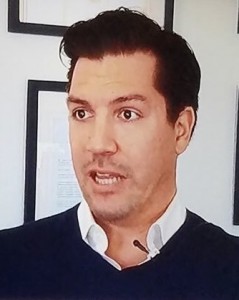
Holley said the state law allows ICE and local law enforcement collaboration to “carry out their duties” in cases where immigrants have been charged with serious crimes. Holley cited research suggesting a relatively low crime rate among undocumented immigrants in general.
“When it comes to criminal involvement and activity by undocumented immigrants, the headlines do not match the reality,” he wrote.
Debra Lucero, who’s running for the District 2 seat against incumbent Wahl, said she wasn’t satistfied that the resolution was needed for public safety, and addressed her questions to the board prior to the vote.
“I’m concerned about the spirit in which this was done,” Lucero said in a telephone interview later Tuesday. “What I’m concerned about is, it puts us on a path to being an even more unwelcome place for migrant farmworkers, when agriculture is our number one industry. What kind of effect will this have on our economy?
“Small farmers,” Lucero added, “found it difficult this year to harvest their crops, to find enough people.”
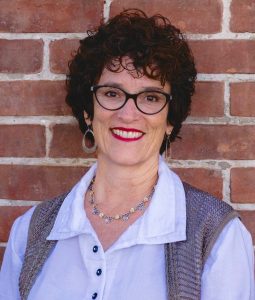
Lambert, who raises cattle and farms walnuts in Butte and two other counties, agreed there’s a labor shortage “especially on the Hispanic side.” He said many people don’t understand the roadblocks in the immigration system and that’s a “frustrating thing.”
Lambert said that while immigrants who have committed crimes should be prosecuted, he becomes concerned if authorities are “harassing good family people.”
“We’ve got to make it easier for people to go to work,” Lambert said. “We have to make it possible for people to get work permits. It’s hard for people who want to do the right thing to do the right thing.”
Lambert said that prior to the Tuesday meeting, he had received requests from constituents asking the board to respond to AB 450.
As the board’s discussion drew to a close Tuesday, Wahl asked about the possibility of filing a court brief in support of lawsuits against the state. In a telephone interview, he said that could come “later on in the process.”
Wahl said he believes the state is forcing California sheriffs to make contact with ICE when they’re releasing prisoners in a “roundabout way.” He indicated that he isn’t satisfied by exceptions in the sanctuary law for serious crime.
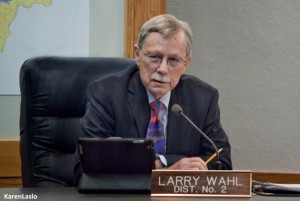
District 2 Supervisor Larry Wahl
“Illegal – and I’m using that word on purpose — illegal aliens [who] have broken the law to enter our country who commit crimes and are not deported and put in jail and to trial” is his concern, he said. “The definition of serious crime has rather changed in the last couple of years.”
Under the Trump administration, immigrants have been deported not only because they’ve committed felony and misdemeanor crimes, but in some cases because they’ve committed civil violations of immigration law.
District 1 Supervisor Bill Connolly said he wasn’t willing to spend taxpayer money pursuing a fight with the state and that could be left to the “rich counties.” Lambert, in the interview, echoed that view, indicating he considers “libraries and firemen” higher priorities.
Julie Garza-Withers from the local chapter of Standing Up for Racial Justice spoke against the resolution and later indicated she was disappointed in the board’s discussion.
“There were no statistics or evidence about how it is a conflict” for the Butte County Sheriff’s Department to have limits on collaboration with ICE, she said in an email statement to ChicoSol.
Garza-Withers argued that Latino immigrants have been stereotyped as “rapists and drug dealers” to justify arguments about public safety.
“The use of ‘safety’ was racially coded given they had no evidence or facts to who is unsafe in Butte County,” she wrote.
Leslie Layton is editor of ChicoSol.

The possibility is this: The county experiences a lack of foreign laborers so eventually if local laborers are trained and encouraged, they can take over those jobs and that would be a starting point for those kinds of wages to increase. If we keep encouraging cheap labor, the divide between rich and poor will increase and bring about more problems. It’s clearly NOT a race issue, it’s obviously economic. In the meantime immigrants who want to become citizens will still continue to do so, as they always have. I don’t see this county encouraging citizenship. We should have more citizenship programs also.
I very much agree with you Ann, that the focus of these issues are economic in nature. However, with the number of illegal aliens in this country the problem becomes exponential, any with large numbers , the level of tolerance decreases geometrically. And that i ls where it does become and issue of race! A matter of supply and/ or verses demand initiates in competition with finite resource such as clean drink water, housing, land-use, and other social resources such as law enforcement, Police services , even access to the Justice system come into place. That is when comparable racial equity comes into play! And that is where the darkest part of human nature can be motivated into action! On both sides which is no good for anyone!